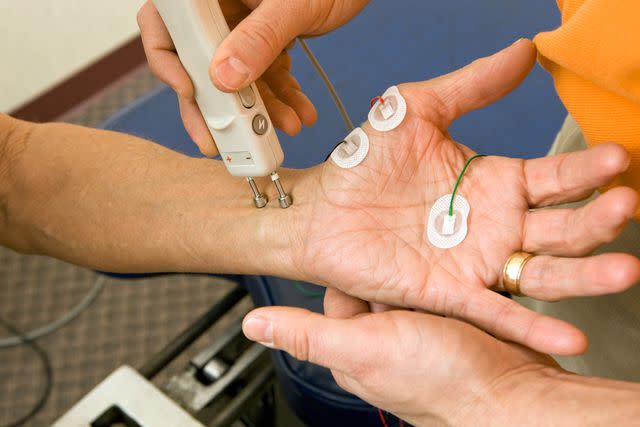Neuropathy in Kidney Disease
Why nerve damage occurs and related symptoms
Medically reviewed by Jordana Haber Hazan, MD
Neuropathy is nerve damage that causes tingling, numbness, pain, and other abnormal nerve sensations in the peripheral nerves (i.e., those of the arms and legs). It can occur for several reasons. Uremic neuropathy is a type that affects patients with advanced kidney disease or end-stage kidney disease patients who are on dialysis.
Unfortunately, neuropathy is very common in those with kidney disease. It may be related to nutrient imbalances, aspects of dialysis, or common overlapping conditions. The nerve damage may be permanent and get worse over time.
This article will look at possible reasons for neuropathy in kidney disease, what it's like, and how it is diagnosed and treated.

BanksPhotos / Getty Images
Why Neuropathy Develops
People with advanced kidney disease or those on dialysis have a higher risk for uremic neuropathy.
The reason(s) for this are unclear, but it could be that:
Nerves tend to degenerate in kidney failure. Deficiencies of essential nutrients like thiamine (vitamin B1) or an excess of zinc might contribute.
Other diseases common in dialysis patients, like hyperparathyroidism, may be to blame.
Certain kinds of neuropathy, like carpal tunnel syndrome, seem to occur more frequently in the arm with dialysis access. A drop in blood supply to the nerves in the hand might be a contributing factor.
An increase in pressure due to dialysis access can lead to excess fluid or blood in the surrounding tissues, which might compress a nerve.
High phosphorus levels may cause calcium phosphate deposits to form, which could contribute to neuropathy.
With objective testing, more than half of dialysis patients could have signs of a nerve problem. Those who don't get the minimum prescribed amount of dialysis have a higher risk of developing neuropathy. However, not everyone with neuropathy and kidney disease is on dialysis.
The high risk for neuropathy may also be associated with the underlying reason for developing nephropathy. Diabetic nephropathy is the leading cause of end-stage renal disease (ESRD) requiring dialysis in the United States. Diabetes is associated with neuropathy.
What Neuropathy Is Like
Depending on the nerves affected, symptoms can vary.
People describe neuropathy as tingling, numbness, or pricking sensation in the hands or feet. Sometimes the pain is described as "burning" or "pins and needles."
As the disease advances, it can lead to muscle weakness and eventual loss of mass in the muscles served by the affected nerve. This is called muscle atrophy.
Related: Causes of Hand and Foot Pain
Diagnosis
Your kidney specialist (nephrologist) may feel comfortable making a uremic neuropathy diagnosis based on symptoms alone.
However, if they're not sure it's neuropathy, they may send you to a neurologist. This type of doctor specializes in, among other things, the peripheral nerves—the 43 pairs of nerves throughout the body that communicate with the brain to make feeling and movement possible.
Expect a neurological exam followed by tests, including:
Blood tests to rule out other possible causes of your pain
Nerve conduction velocity study, which measures how fast electrical signals travel through nerves (the gold standard for diagnosing neuropathy)
Electromyography (EMG), which measures electrical activity in nerves
Additional tests may also be done depending on your specific symptoms.
Treatment
A kidney transplant is the best treatment for uremic neuropathy. However, that's really only a viable option if you're already a candidate for a transplant. That leaves most people exploring other options.
As neuropathy can be a sign of inadequate dialysis, your kidney specialist will likely order blood tests to confirm you're getting enough dialysis to remove the urea and other wastes from your system. If not, that will be adjusted.
Beyond that, treatments vary depending on what's believed to be causing your neuropathy. Treating the underlying cause may relieve your symptoms.
For example, your doctor may look for vitamin and mineral deficiencies that could cause neuropathy. If any are found, you'll likely be given supplements to increase levels. Nerve compression, such as carpal tunnel syndrome, may require physical therapy or surgery.
Medications
Topical relievers such as Zostrix (capsaicin) or Lidocaine patches also may be options.
If these measures fail, you may be prescribed a medication for neuropathy. Several classes of medication may be considered, including:
Antidepressants: Cymbalta (duloxetine), Elavil (amitriptyline)
Anti-seizure drugs: Lyrica (pregabalin), Neurontin (gabapentin), Carbatrol (carbamazepine), Oxtellar XR/Trileptal (oxcarbazepine)
Antiarrhythmic drugs: Mexitil (mexiletine)
Opioid painkillers: Ultram (tramadol), Nucynta (tapentadol), methadone
Opioids tend to be less effective than other drugs at treating neuropathic pain.
Other Treatments
Complementary treatments are sometimes used in neuropathy as well.
Physical therapy: Nerve dysfunction can lead to muscle weakness and balance problems, which may be helped by physical therapy.
Transcutaneous electrical nerve stimulation (TENS): Electrodes reduce pain by delivering a mild electrical current into painful areas.
Acupuncture: Thin needles inserted into the body may affect nerve function, combat neuroinflammation, or stimulate natural healing and pain-killing functions of the nervous system.
Summary
Kidney disease and dialysis can lead to neuropathy pain and muscle atrophy. The exact reasons for this are unknown but several possible causes exist. They include vitamin and mineral imbalances, added pressure from dialysis, and overlapping conditions.
Several tests can help your doctor diagnose neuropathy. Treatment may focus on the underlying cause (if it's known) or on medications that manage your pain.
Prescription medications including antidepressants and anti-seizure drugs are common choices. Topical pain relievers and complementary treatments such as physical therapy and acupuncture may help as well.
Related: Neuropathy Creams: Do They Work?
Read the original article on Verywell Health.
